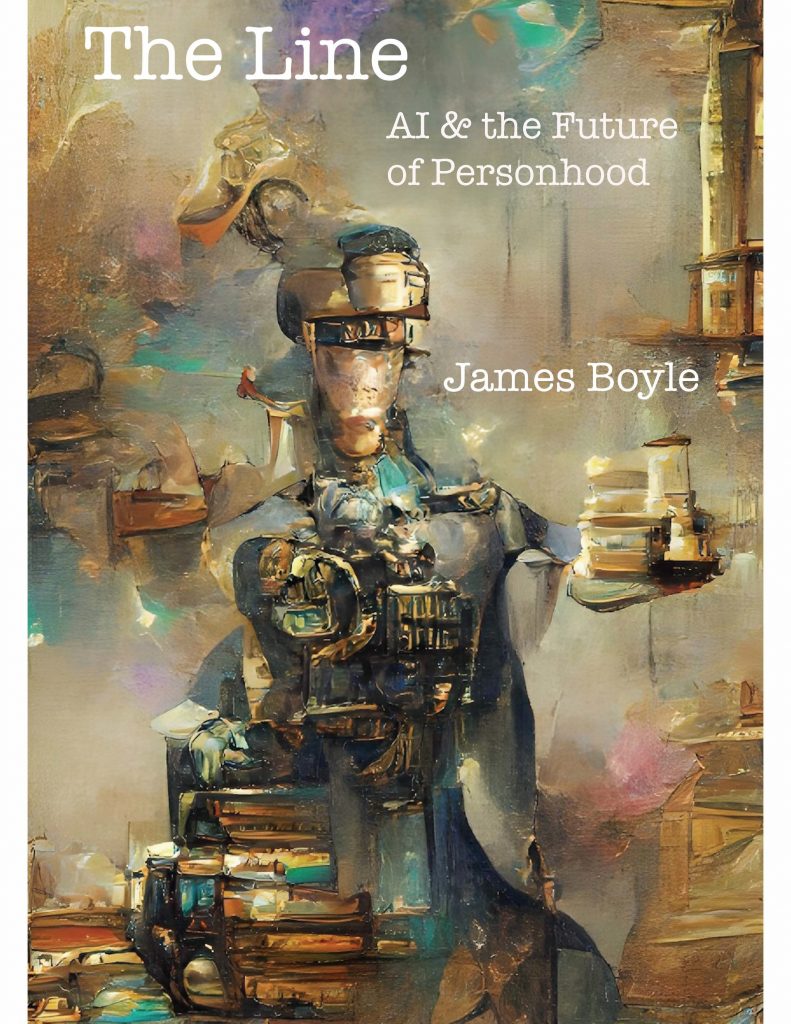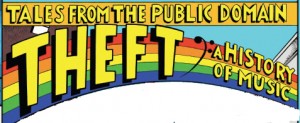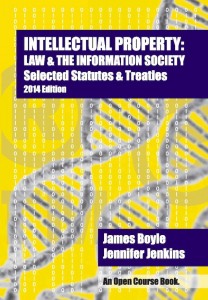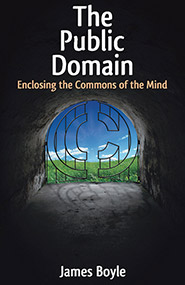I have been rereading the legislative history of the 1909 Copyright Act. I have come to the conclusion that 100 years ago we were smarter about copyright, about disruptive technologies, about intellectual property, monopolies and network effects than we are today. At least, the legislative hearings were much smarter. The hearings I am looking at took place in 1906 — thanks to the wonder of Google books you can read them yourself, if you are really nerdy.
There are lots of delights here. There is John Philip Sousa (yes, the one who wrote the march that forms the Monty Python theme music) popping up again and again to make his point.. So far as I can tell, he had a wild card from the chair to interrupt whenever it suited him.. viz.
The thing that Sousa (and some other American composers) and the music publishers were most upset about was the fact that copyright covered printing and public performance, but did not cover the mechanical reproduction involved in cutting a roll for a player piano or recording a disk or a cylinder for a phonograph or gramophone. Their goal was to get a new provision (section g) which would give composers (and thus publishers) the right to charge a royalty for these sound recordings. In strong opposition was the recording industry — which violently denied that the copyright holders should gain any share of the new market that (as they saw it) had been created out of thin air by technological innovation. To give copyright holders a veto over technology, they argued, would be fatal to the progress the Copyright Clause was designed to promote. As Larry Lessig points out in Free Culture (which has a superb chapter on this story) there is no small irony involved here, since this is the opposite position that the recording industry takes today (having secured their legal rights) when they face the new technologies of the Net. What’s more, the representatives of the recording and player piano industry believed that there was no harm being done to the composers by the mechanical reproduction of their music.
(statement of Albert Walker, representative of the Auto-Music Perforating Company of New York)
There were intense debates about the constitutionality of the legislation — piano rolls were not “writings” and restricting accessibility to them was not thought to promote the progress of science or the useful arts, and there were even debates about the correct way to conceptualize intellectual property rights…
There were discussions of whether intellectual property was the norm or the exception
And, my favourite of all, there were passionate attacks on the morality of the publisher’s position on the ground that it was the technologies and not the content, that had revolutionized music in the way the constitution envisaged, by dramatically expanding its distribution to the public, removing the bottleneck of the human who was required to translate musical score into listenable music.
That’s Philip Mauro of the American Graphophone Company — who later became a leading religious writer — and at the end he is striking the note that all the technologists did. The music publishers had a web of contracts in place with which they would create a “trust”, a monopoly, that would dominate music and restrict its availability to the public. As Mauro saw it, on the one side was the threat of monopoly, the squelching of innovation and the greed of the content owners, who were exploiting a misconception about the absolute quality of property rights. “All talk about dishonesty and theft in this connection from however high a source is the merest claptrap for there exists no property in ideas musical, literary or artistic except as defined by statute.”
I quote all this not because I agree with the record industry of the 1900’s — though I wish their representatives today were similarly sophisticated. I’d really like the RIAA to read Mr. Mauro’s speeches and see if it makes them change their minds at all about the disruptive technologies of today. I find no injustice in the composers getting a share of the revenues produced by sound recordings and piano rolls — I would have voted for it myself. And the solution to the problem of the latent monopoly — namely a compulsory license — accomplished that goal without stultifying the technology or restricting distribution to the public. All in all — the fulminations of Sousa and Mauro aside — it was a pretty nice piece of legislation. The legislators actually seemed to understand the arguments made to them. The conceptual confusions of absolute property rights were repeatedly debunked. There were explicit balances made in the statute — weighing technological progress and the encouragement of the arts and culture. Constitutional arguments were weighed and taken into account. They even saw and mitigated the threat of monopoly with a compulsory license. Nowadays when a compulsory license over, say AIDS drugs, is pursued by a country like Thailand, the US Trade Representative beats them up for adopting such “radical” and confiscatory approach. Nothing could be more foreign to the American tradition of intellectual property than compulsory licenses! Hogwash. Our music industry is built on them.
The world of 1906 was hardly perfect — I wouldn’t want to live then. And the 1909 statute was full of its own boondoggles and industry grabs. But if one looks back at these transcripts and compares them to today’s hearings — with vacuous rantings from celebrities and the bloviation of bad economics and worse legal theory from one industry representative after another — it is hard not to feel a sense of nostalgia. In 1900, it appears, we were better at understanding that copyright was a law that regulated technology, a law with constitutional restraints, that property rights were not absolute and that the public would not automatically be served by extending rights out to infinity.
https://twitter.com/thepublicdomain
Paul Bukhovko kindly provided a Belorussian translation of this page.









The “copyright” version of the story of St. Columba and St. Finian did not exist before the 16th century, and may in fact reflect tensions that had arisen subsequent to the introduction of moveable type on the continent of Europe and in Britain in the 15th century. Medieval sources record a quarrel between the two saints over the right of sanctuary. A late medieval source records a quarrel concerning a “book” but gives no details. (My hunch is that, in that account “book” (de iibro) may be a misprint for “child” (de libero), that is, it was repeating the tale of the quarrel over the right of sanctuary). But however that may be, it was not until the 16th century that the tale concerning a “book” was set into the famous form it now has.
The assertion that in England there was no property in literary production before the statute of Ann is not accurate. In fact, the right of printing belonged to members of the Stationers Company (and the universities). The Stationers Company had a system that secured to member who first registered a book a perpetual right to that “copy”. Until the late seventeenth century, it was also necessary to obtain an official license before a work could be printed. If another member infringed on the registrant’s right, the Company had the power to seize the books and dispose of them as it saw fit. (Often, if they were not destroyed, they were awarded to the member whose right had been infringed.) And if a nonmember presumed to print anything, the Company was empowered to seize and destroy both the copies and the press. It is true that this accorded the author little or no standing, as the story about Milton illustrates. But the notion that anyone could print anything is quite false. It seems that little has changed in the past century.
[…] Boyle at The Public Domain analyses transcripts from 1909 with some interesting revelations about the recording industry “The […]
[…] 19, 2009 From this article about the fight surrounding the 1909 copyright act: That’s Philip Mauro of the American Graphophone Company — who later became a leading religious […]
So Statute of Anne is the first time the “author” got the right. The Stationers Guild, the the other guilds of the time, got a license from the crown to produce and import their skilled labor: bound books. Authors could still write whatever, copy whatever, but they could not get “published” without crown approval through the guild. There was not separate “intellectual property” right vested in the author, but it worked like wood to carpenter. The author who did the work gave up all rights when it was sold to the publisher. It made sense at the time. Publishing is where the heavy lifting was, but more importantly, the tangible product to be sold to the public. Since licenses were granted to court favorites, the glorious revolution in 1689 lead to lapse of many licenses, Stationer’s Guild included. When the Stationer’s Guild back in 1710, it, author’s rights was a concession the Guild made. The type of right or property or license, whatever you want to call it, was definitely changed by Statute of Anne, and placing it in the author was the big shift. Probably as a big a shift (mess) as creating a “derivative work” right in 1909.
Isn’t a piano roll more like a midi file? Not as much pursued as sound recordings, but still copyrighted. Interesting piece.
“All talk about dishonesty and theft in this connection from however high a source is the merest claptrap for there exists no property in ideas musical, literary or artistic except as defined by statute.”
“Ideas” or “original expressions”? It’s ironic that I hear that argument often used in respect of copyright, where it seems to me it has rather little (moral) weight, but rarely in respect of patents, esp. software and biz method patents, where theft *by* patent is common.
Just for reference, your Google Books link only works in the US (which is quite strange considering it’s public domain content).
[…] Were we smarter 100 years ago..? | The Public Domain | […]
[…] Were we smarter 100 years ago..? The Public Domain […]
Read the speeches on copyright that Thomas Macaulay gave to Parliament in 1841/1842
https://www.baen.com/library/palaver4.htm
We were smarter 167 years ago. Read the speeches on copyright that Thomas Macaulay gave to Parliament in 1841/1842
https://www.baen.com/library/palaver4.htm
Copyright sheds on the creation of property “rights” in general. As the Constitution makes clear, copyright and patent protection for a limited period of time were created to incentivize the creation of wealth, not as recognition of some God-given right. That ownership of real and personal property came from a process centuries older obscured a similar move, converting possession to enforced property ultimately for the same reasons.
[…] found a really interesting read about copyright laws, then and now. The “then” was 1906. The arguments back then pitted […]
[…] Were we smarter 100 years ago? — 9:13am via Google […]
[…] Were we smarter (about Copyright) 100 years ago..? | The Public Domain | (tags: Vintage Copyright history) […]
[…] Billie’s quickies An interesting comparison of copyright law then and now that poses the question: “Were we smarter 100 years ago?” […]
“I’d really like the RIAA to read Mr. Mauro’s speeches and see if it makes them change their minds at all about the disruptive technologies of today.”
This is a very naive comment. The RIAA isn’t making an intellectual argument, they are making an argument to preserve their own interests. Politics and the finances of large corporate entities are not academic arguments. You can’t just show the RIAA a logically sound counter argument and then expect them to cancel their lawyers and concede the case.
[That’s, like, totally been my approach over the last 20 years. What was I thinking! Doh!! JB]
[…] you can read it all here at Were we smarter 100 years ago..? July 20th, 2009 | Category: computer | Leave a […]
An important point of clarification is in order here. The piano rolls were not “sound recordings”. They were mechanical reproductions of compositions. The argument was that you couldn’t “read” a piano roll as you could “read” sheet music. Therefore the rolls weren’t “writings” protected by statute.
The compulsory license was instituted to balance out the concerns of both sides.
Sound recordings were not copyrightable in the United States until February 15, 1972. They were however protected under state property laws.
You are right of course about the idea that piano rolls weren’t writings — I say so explicitly in the post — although it was a view that was hotly disputed by Sousa and others. But piano rolls actually could be recordings and I’d disagree that they were just “mechanical reproductions of compositions.” Gershwin, for example, recorded a number of piano rolls for Remick. Some (but not all) piano roll recording devices could capture extremely detailed information of what the player was doing and then allow the piano to play that back. That is, the roll was capturing not merely the score, but the playing of the score by an individual player. The more sophisticated version of that technique dates from around 1904. But its true that they weren’t capturing sound waves — they were recording player movements that created sound waves.
I thought I had indicated the difference.. “copyright covered printing and public performance, but did not cover the mechanical reproduction involved in cutting a roll for a player piano or recording a disk or a cylinder for a phonograph or gramophone.” “I find no injustice in the composers getting a share of the revenues produced by sound recordings and piano rolls.”
But clarity is important and I did once call them both sound recordings. Thanks for the correction.
As to the other points, perhaps its an accident of clumsy exposition. And as you know, the 1909 act did give the composer a right that would be infringed by an unlicensed roll or gramophone recording. The recording was not copyrightable, but the recording would infringe the composition’s copyright. The sound recording right giving a separate protection to recordings — distinct from the composition of those recordings — does indeed date from 72.
[…] won’t, rather than can’t, see what’s obvious to the rest of us. Yesterday, I linked to an article that culled the archives of google books that pointed out the 180 the music industry has done since […]
[…] anonymous reader writes “James Boyle has a blog post comparing the recording industry’s arguments in 1909 to those of 2009, with some lovely Google book links to the originals. Favorite quote: ‘Many and numerous […]
[…] Were we smarter 100 years ago..? I have been rereading the legislative history of the 1909 Copyright Act. I have come to the conclusion that 100 years ago we were smarter about copyright, about disruptive technologies, about intellectual property, monopolies and network effects than we are today. At least, the legislative hearings were much smarter. The hearings I am looking at took place in 1906 — thanks to the wonder of Google books you can read them yourself, if you are really nerdy. […]
[…] ir informacijos sklaidą, yra itin daug. Tyrinėjantys autorių teisių ištakas pastebi, kad prieš šimtą metų autorių teisių kūrimo tikslas buvo gerokai kilnesnis, nors diskusijų ir kovos su norinčiais tiesiog pasipelnyti iš svetimos kūrybos ir tuomet […]
[…] intellectual property law recommended technology 21 Jul 2009 From thepublicdomain.org comes this interesting and revealing series of excerpts from the legislative history of the 1909 Copyright Act: I have been rereading the legislative […]
[…] Were we Smarter about Copyright 100 Years Ago? […]
[…] Edathy (SPD, Vorsitzender des Innenausschusses des Bundestages) gefordert. (tags: buch zensursula) Were we smarter 100 years ago..? | The Public Domain | Reading the copyright act of 1909, comparing it today. How and why we went wrong. (tags: copyright) […]
[…] Were we smarter 100 years ago..? Copyright © By James Boyle For original English text, go to: https://www.thepublicdomain.org/2009/07/17/were-we-smarter-100-years-ago/ […]